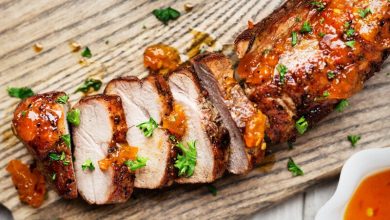A versatile all-purpose marinade is a fantastic addition to any recipe collector’s repertoire. It’s a rich and flavorful mixture that can elevate the taste of various dishes. Here’s a detailed response to your questions:
What is it?
An all-purpose marinade is a liquid mixture primarily used to flavor and tenderize meats, seafood, or vegetables before cooking. It serves as a flavor enhancer, adding depth and complexity to your dishes.
History:
Marinades have been used in cooking for centuries. The history of marinades is closely tied to the preservation of food before the advent of refrigeration. Ancient civilizations, such as the Greeks and Romans, used marinades to preserve and flavor their foods. Over time, the focus shifted from preservation to enhancing flavor.
Components:
The components of an all-purpose marinade can vary, but here are some common ingredients:
- Acid: Typically, vinegar or citrus juice (like lemon or lime) provides acidity, which helps tenderize the food.
- Oil: Olive oil or vegetable oil adds richness and helps carry the flavors into the food.
- Aromatics: Garlic, onions, shallots, and herbs (like rosemary, thyme, or basil) contribute to the flavor profile.
- Seasonings: Salt, pepper, and spices (such as paprika, cumin, or red pepper flakes) are used to season the marinade.
- Sweetener: Sometimes, a touch of sweetness from honey, sugar, or maple syrup balances the flavors.
- Umami: Soy sauce or Worcestershire sauce can add depth and umami to the marinade.
Steps to Prepare:
Here’s a basic recipe for an all-purpose marinade:
-
Combine Ingredients: In a bowl or a resealable plastic bag, mix together your choice of acid, oil, aromatics, seasonings, sweetener, and umami component. Use the ratios that suit your taste.
-
Marinate: Place your protein (meat, seafood, or vegetables) in the marinade. Ensure it’s fully coated. Seal the container or bag and refrigerate. The time needed for marinating depends on the type of food:
- Fish and seafood: 15 minutes to 1 hour.
- Poultry: 1 to 4 hours.
- Red meat: 2 to 24 hours.
- Vegetables: 30 minutes to 2 hours.
-
Grill, Roast, or Cook: After marinating, you can grill, roast, or cook your marinated food as desired.
Time Needed to Prepare:
The time required to prepare an all-purpose marinade is typically minimal, about 5-10 minutes. The marinating time can vary, as mentioned above, but it’s essential to factor in this time when planning your meal.
Remember, the longer you marinate, the more intense the flavor will be. However, avoid marinating seafood for too long, as the acid can “cook” it over time.
Enjoy experimenting with different ingredients to create your own signature all-purpose marinade that suits your rich style and love for food and beverages. Happy cooking!
Certainly, here are some general nutrition facts and health information for an all-purpose marinade mixture:
Nutrition Facts (Per Serving – 1 tablespoon, approximately):
- Calories: Approximately 50 calories
- Total Fat: 5 grams
- Saturated Fat: 0.5 grams
- Sodium: 200-300 milligrams (varies based on ingredients)
- Carbohydrates: 1-2 grams
- Sugar: 0-1 gram
- Protein: 0 grams
Health Information:
-
Calories: Marinades are relatively low in calories per serving, making them a calorie-conscious choice for flavoring dishes.
-
Total Fat: The fat content primarily comes from the oil used in the marinade. Olive oil, a common choice, contains heart-healthy monounsaturated fats.
-
Saturated Fat: While the total fat content is relatively low, be mindful of the type of oil used. Using oils with lower saturated fat content is generally healthier.
-
Sodium: The sodium content can vary based on ingredients like soy sauce or salt. High sodium intake can contribute to hypertension, so it’s essential to moderate your overall salt consumption.
-
Carbohydrates and Sugar: Marinades typically contain minimal carbohydrates and sugar, making them suitable for low-carb diets.
-
Protein: Marinades themselves are not a significant source of protein, but they enhance the flavor of protein-rich foods like meat and seafood.
Health Tips:
-
Use Healthier Oils: Opt for heart-healthy oils like extra-virgin olive oil or avocado oil, which are rich in monounsaturated fats.
-
Watch Sodium Intake: Be mindful of the sodium content in your marinade, especially if you have high blood pressure or are watching your salt intake. Consider using lower-sodium soy sauce or alternatives.
-
Customize to Your Needs: You can adjust the ingredients in your marinade to suit your dietary preferences. For example, use less sweetener or choose low-sugar options if you’re concerned about sugar intake.
-
Balance Your Diet: While marinades can enhance the flavor of your dishes, remember to incorporate a variety of foods to ensure a balanced diet that meets your nutritional needs.
Keep in mind that these nutrition facts are approximate and can vary based on the specific ingredients you use in your all-purpose marinade. Always check product labels for accurate nutritional information, especially if you have specific dietary requirements or health concerns.



